Openreach FTTP ONT: Difference between revisions
mNo edit summary |
mNo edit summary |
||
| Line 76: | Line 76: | ||
== External links == |
== External links == |
||
* [https://www.openreach.com/content/dam/openreach/openreach-dam-files/images/news-and-opinion/articles/2018/02/ONT%20Factsheet.pdf 1+1 ONT and Enclosure Factsheet] |
* [https://www.openreach.com/content/dam/openreach/openreach-dam-files/images/news-and-opinion/articles/2018/02/ONT%20Factsheet.pdf 1+1 ONT and Enclosure Factsheet] |
||
=Outdoor Junction box= |
|||
[[File:CF-BT-Outside-spice-boxes.jpg|thumb|alt=CityFibre and Openreach outdoor Junction box|Outdoor Junction Box]] |
|||
CityFibre will usually install a junction box on the outside of the property. This connects up the fibre from the street to the fibre that goes inside the property. |
|||
This is a passive device, doesn't require power, and is just used to connect the two fibres together. |
|||
Revision as of 13:02, 26 April 2024
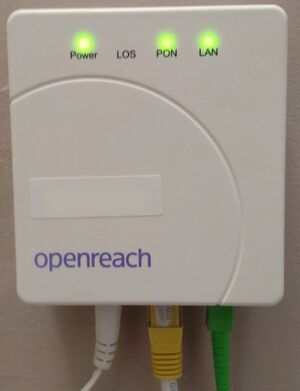

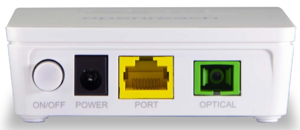
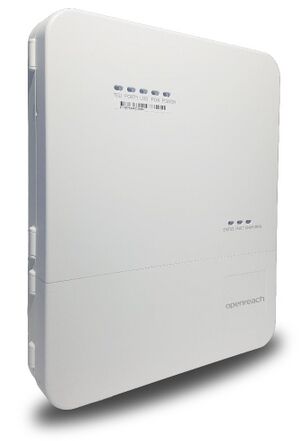
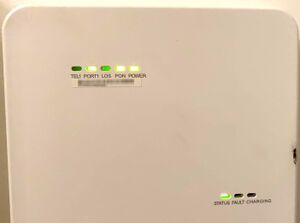
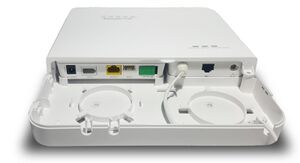
This page is about the FTTP termination device that Openreach install for FTTP customers. ONT stands for Optical Network Terminal, sometimes (mistakenly) called an openreach modem. CityFibre use a different ONT - we have a separate page on that: CityFibre ONT
Summary:
- In short, the ONT in installed inside the customer's premises by CityFibre and converts the fibre connection from the outside world in to a RJ45 port which you plug in to your router with a CAT5 cable.
- The ONT requires power, and a UPS is recommended, see our VoIP_Power page for suggestions.
Openreach provide an ONT for use with FTTP services. - so when you order a BT-based FTTP service from A&A, an Openreach engineer will install the little ONT unit in your premises. You then connect your Ethernet router to it and set your router with the A&A PPP credentials to log in.
This page is about diagnosing problems with the Openreach ONT.
- A working Openreach unit has green: power, PON & LAN lights, anything else indicates a problem.
- Your PPPoE capable router will plug in to the LAN port and connect you to the internet.
More info
- Newer ONT installs do not include a Battery Backup Unit (BBU) See: 999_and_faults
- Older Openreach ONT (Optical Network Termination) such as the one pictured, is actually inside the enclosure. This also contains a Battery Backup Unit (BBU) along with various wiring and cable management.
- The ONT requires power, so will need a mains power socket nearby.
- Where provided, the battery has a short warranty, and should be maintained by the end user, however, the battery is to keep the unit powered so that the TEL ports can be used during a power outage - we don't use the TEL ports, so you will want to make other arrangements for using a phone during a power outage - eg a mobile phone. See: 999_and_faults
Openreach ONT LED Status
| LED | Colour | Meaning | Notes | ||
|---|---|---|---|---|---|
| Top (ONT) LEDs | |||||
| TEL1 | Off | We don't use the Tel ports | |||
| PORT1 or LAN | Blinking/Flashing green | Data being transmitted | Good | ||
| Off | ONT has no ethernet link to the router | Bad. Check the connection/cable to the router | |||
| LOS (Loss of service) PON (Passive Optical Network) |
PON solid green, LOS off | Connected and should be working | Good. This is how it should be normally | ||
| PON flashing green, LOS off | ONT is starting up | Wait a bit for steady green and all should be well... | |||
| PON off, LOS solid red | Possible fault with the fibre | Bad. Check fibre not damaged, reconnect fibre, power cycle ONT | |||
| POWER | Solid green | Device has power | Good | ||
| Off | Power is off | Bad. Check mains power and connection to BBU/ONT | |||
| Bottom right (BBU) LEDs | |||||
| STATUS | Solid green | Good | |||
| Off | |||||
| FAULT | Solid red | Battery fault | Bad. Replace the AA batteries inside | ||
| Off | Good. No fault | ||||
| CHARGING | Solid orange | Batteries are not fully charged | Wait; the batteries are charging (usually after a power cut) | ||
| Off | Batteries are not being charged | Good. The batteries are fully charged | |||
External links
Outdoor Junction box
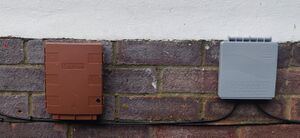
CityFibre will usually install a junction box on the outside of the property. This connects up the fibre from the street to the fibre that goes inside the property.
This is a passive device, doesn't require power, and is just used to connect the two fibres together.